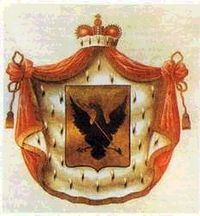
The Crimean War was fought from October 1853 to February 1856 between the Russian Empire and an ultimately victorious alliance of the Ottoman Empire, France, the United Kingdom, and Sardinia-Piedmont. Geopolitical causes of the war included the decline of the Ottoman Empire, the expansion of Russia in the preceding Russo-Turkish Wars, and the British and French preference to preserve the Ottoman Empire to maintain the balance of power in the Concert of Europe. The flashpoint was a disagreement over the rights of Christian minorities in Palestine, then part of the Ottoman Empire, with the French promoting the rights of Roman Catholics, and Russia promoting those of the Eastern Orthodox Church. However, this served only as a pretense for the war; in fact, the countries were fighting over who would rule the Ottoman Empire.

The Battle of the Chernaya was fought near to the Chernaya River during the Crimean War on August 16, 1855. The battle was fought between Russian, French, Piedmontese and Ottoman troops. The Chernaya River is on the outskirts of Sevastopol, near the line of the allies' siege of the city. The battle ended in a Russian retreat and a victory for the French, Piedmontese, and Ottomans.

Pavel Stepanovich Nakhimov was a Russian admiral in the Imperial Russian Navy known for his victory in the Battle of Sinop and his leadership in the Siege of Sevastopol (1854–1855) during the Crimean War.

Count Ivan Fyodorovich Paskevich-Erevansky, Serene Prince of Warsaw was a Russian military leader who was the namiestnik of Poland.
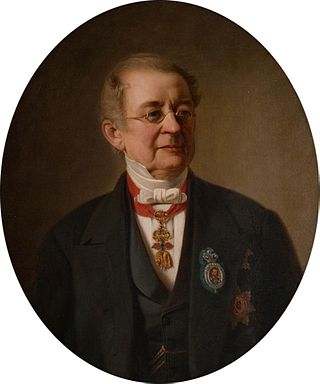
Prince Alexander Mikhailovich Gorchakov was a Russian diplomat and statesman from the Gorchakov princely family. He has an enduring reputation as one of the most influential and respected diplomats of the mid-19th century. Scholars agree that the termination of the demilitarisation of the Black Sea was Gorchakov's greatest accomplishment but add that he stayed too long as foreign minister.
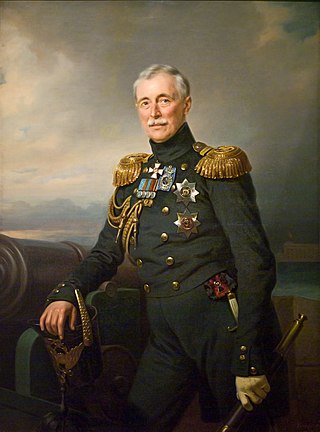
Prince Alexander Sergeyevich Menshikov was a Russian nobleman, military commander and statesman. He was made adjutant general in 1817 and admiral in 1833.

Prince Mikhail Dmitrievich Gorchakov was a Russian General of the Artillery from the Gorchakov family, who commanded the Russian forces in the latter stages of the Crimean War and later served as a Namestnik of Kingdom of Poland from 1856 until his death. His military career included remarkable successes, such as the Battle of the Great Redan, as well as significant setbacks, such as the Battle of the Chernaya.

Prince Pyotr Dmitrievich Gorchakov was an Imperial Russian Army general from the Gorchakov family of Russian nobility.

The siege of Kars was the last major operation of the Crimean War. In June 1855, attempting to alleviate pressure on the defence of Sevastopol, Emperor Alexander II ordered General Nikolay Muravyov to lead his troops against areas of Ottoman interest in Asia Minor. Uniting disparate contingents under his command into a strong corps of 25,725 soldiers, 96 light guns, Muravyov decided to attack Kars, the most important fortress of Eastern Anatolia.
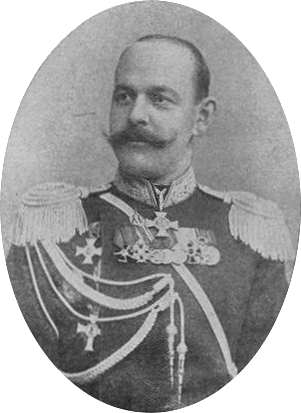
The Namiestnikof the Kingdom of Poland was the deputy of the Emperor of Russia who, under the Congress Kingdom of Poland (1815–1915), styled himself "King of Poland". Between 1874 and 1914, the title Namiestnik was replaced by that of Governor-General of Warsaw .[a]

Prince Aleksey Ivanovich Gorchakov was a Russian general and statesman from the Gorchakov family.

Nikolai Onufrievich Sukhozanet was an Imperial Russian Army general and statesman.

Prince Alexander Ivanovich Chernyshyov, General of Cavalry (1827), was a Russian military leader, diplomat and statesman, whose career began in the Napoleonic Wars. After the Battle of Austerlitz (1805), he carried out successful diplomatic missions to France and Sweden and served with distinction in battles of 1812 and 1813. Chernyshyov rose through the ranks to the role of Russian Minister of War (1827–1852), chairman of the State Council and Cabinet of Ministers (1848–1856), and acquired the styles from Count (1826) to Serene Prince (1849).

General Nicholas Nikolaievich Annenkov was an influential Russian General of the Infantry, Governor-General of Kiev and Bessarabia, and member of the State Privy Council. He was the brother of prominent Russian poet, Varvara Annenkova.
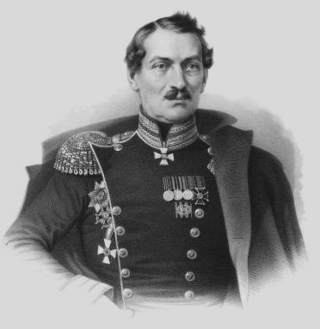
General Pavel Petrovich Liprandi was a Russian military officer of Spanish-Italian descent who participated in the Crimean War.

The siege of Silistria, or siege of Silistra, took place during the Crimean War, from 11 May to 23 June 1854, when Russian forces besieged the Ottoman fortress of Silistria. Sustained Ottoman resistance had allowed French and British troops to build up a significant army in nearby Varna. Under additional pressure from Austria, the Russian command, which was about to launch a final assault on the fortress town, was ordered to lift the siege and retreat from the area, thus ending the Danubian phase of the Crimean War.

Pyotr Pavlovich Albedinsky (1826–1883) was a Russian military officer and politician.

Arkady Dmitrievich Stolypin (1822–1899) was an Imperial Russian general of artillery, governor of Eastern Rumelia and commandant of the Kremlin Palace guard. He was the father of Pyotr Stolypin. His second wife was Natalia Mikhailovna Stolypina, the daughter of Prince Mikhail Dmitrievich Gorchakov, the Commanding general of the Russian infantry during the Crimean War and later the governor general of Warsaw.

The Greek Volunteer Legion was a volunteer military corps formed by Greeks and other Balkan Christians that fought for the Russian Empire during the Crimean War. It was formed in the Danubian Principalities in March 1854, and some elements participated in the final engagements of the Danube theatre, before the Russian troops abandoned the Principalities. From there the Legion was sent to the Crimea, where it fought in the Siege of Sevastopol. In 1855 the Legion received the title Greek Legion of Emperor Nicholas I. After the end of the siege, the bulk of the Legion was discharged, and the remainder of the unit was disbanded after the war's end in March 1856. Most of the volunteers returned to their homelands, although a few settled in Russia.

Egor or Yegor Petrovich Kovalevsky was a Russian traveller, writer, and diplomat.
